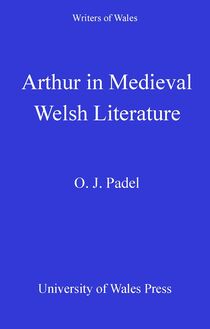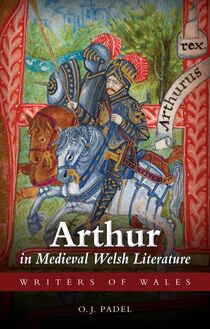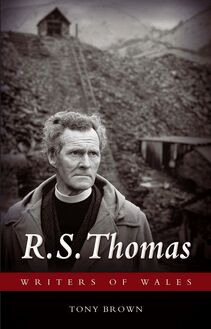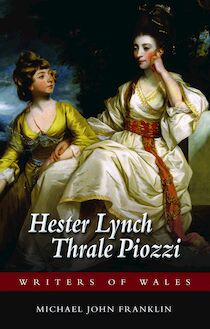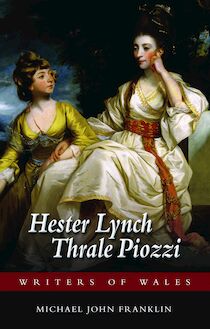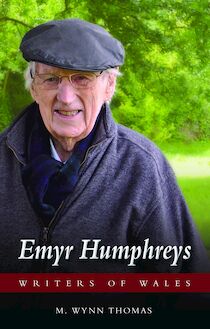-
 Univers
Univers
-
 Ebooks
Ebooks
-
 Livres audio
Livres audio
-
 Presse
Presse
-
 Podcasts
Podcasts
-
 BD
BD
-
 Documents
Documents
-
- Cours
- Révisions
- Ressources pédagogiques
- Sciences de l’éducation
- Manuels scolaires
- Langues
- Travaux de classe
- Annales de BEP
- Etudes supérieures
- Maternelle et primaire
- Fiches de lecture
- Orientation scolaire
- Méthodologie
- Corrigés de devoir
- Annales d’examens et concours
- Annales du bac
- Annales du brevet
- Rapports de stage
La lecture à portée de main
Vous pourrez modifier la taille du texte de cet ouvrage
Découvre YouScribe en t'inscrivant gratuitement
Je m'inscrisDécouvre YouScribe en t'inscrivant gratuitement
Je m'inscrisEn savoir plus
Vous pourrez modifier la taille du texte de cet ouvrage
En savoir plus

Description
Jane Williams (Ysgafell) was a writer with a long and varied list of publications: poetry, fiction, a riposte to the 1847 Blue Books, the ‘autobiography’ of Betsi Cadwaladr, a history of Wales, a biography of the historian and patriot Carnhuanawc, and a history of women’s writing in English. In her writing and her life she crossed and re-crossed boundaries – national, social, literary, linguistic and cultural – and carved out her own path. As a nineteenth-century woman whose writing career spanned fifty years and many genres, including serious non-fiction and texts in English on Wales and matters Welsh, Jane Williams is unique. This is the first full-length study of her life and work, comprising detailed original research from which the author has drawn a picture of a remarkable and impressive woman writer.
Chapter 1 - Becoming a Writer
Chapter 2 - Responses to the Blue Books
Chapter 3 - Varieties of Life Writing
Chapter 4 - Decisions and Directions
Chapter 5 -The Writing of History
Appendix 1
Appendix 2
Notes
Bibliography
Sujets
Informations
| Publié par | University of Wales Press |
| Date de parution | 15 mars 2020 |
| Nombre de lectures | 0 |
| EAN13 | 9781786835659 |
| Langue | English |
Informations légales : prix de location à la page 0,1074€. Cette information est donnée uniquement à titre indicatif conformément à la législation en vigueur.
Extrait
Writers of Wales
Jane Williams (Ysgafell)
Editors:
Jane Aaron
M. Wynn Thomas
Andrew Webb
Honorary Series Editor:
R. Brinley Jones
Meic Stephens †
Other titles in the Writers of Wales series:
Hester Lynch Thrale Piozzi (2020), Michael John Franklin
Christopher Meredith (2018), Diana Wallace
B. L. Coombes (2017), Bill Jones and Chris Williams
Owen Rhoscomyl (2016), John S. Ellis
Dylan Thomas (2014), Walford Davies
Gwenlyn Parry (2013), Roger Owen
Welsh Periodicals in English 1882–2012 (2013), Malcolm Ballin
Ruth Bidgood (2012), Matthew Jarvis
Dorothy Edwards (2011), Claire Flay
Kate Roberts (2011), Katie Gramich
Geoffrey of Monmouth (2010), Karen Jankulak
Herbert Williams (2010), Phil Carradice
Rhys Davies (2009), Huw Osborne
R. S. Thomas (2006), Tony Brown
Ben Bowen (2003), T. Robin Chapman
James Kitchener Davies (2002), M. Wynn Thomas
Writers of Wales
Jane Williams (Ysgafell)
Gwyneth Tyson Roberts
© Gwyneth Tyson Roberts, 2020
All rights reserved. No part of this book may be reproduced in any material form (including photocopying or storing it in any medium by electronic means and whether or not transiently or incidentally to some other use of this publication) without the written permission of the copyright owner except in accordance with the provisions of the Copyright, Designs and Patents Act 1988. Applications for the copyright owner’s written permission to reproduce any part of this publication should be addressed to the University of Wales Press, University Registry, King Edward VII Avenue, Cardiff CF10 3NS.
www.uwp.co.uk
British Library Cataloguing-in-Publication Data
A catalogue record for this book is available from the British Library.
ISBN 978-1-78683-563-5
e-ISBN 978-1-78683-565-9
The right of Gwyneth Tyson Roberts to be identified as author of this work has been asserted by her in accordance with sections 77, 78 and 79 of the Copyright, Designs and Patents Act 1988.
The University of Wales Press acknowledges the financial assistance of the Books Council of Wales in the publication of this book.
The publisher has no responsibility for the persistence or accuracy of URLs for any external or third-party internet websites referred to in this book, and does not guarantee that any content on such websites is, or will remain, accurate or appropriate.
Cover image: Jane Williams (Ysgafell), supplied by LlyfrgellGenedlaetholCymru/National Library of Wales
To all the friends in Aberystwyth, London, Pembrokeshire and Swansea who over the years have continued to ask how my work on Jane Williams was going, and then listened patiently to the answer
Jane Williams (Ysgafell), c .1870
Supplied by Llyfrgell Genedlaethol Cymru/National Library of Wales.
Contents
Acknowledgements
Abbreviations
List of illustrations
1 Becoming a Writer
2 Responses to the Blue Books
3 Varieties of Life Writing
4 Decisions and Directions
5 The Writing of History
Appendix 1 Jane Williams’s Birthplace and Early Life
Appendix 2 The Authorship of Twenty Essays
Notes
Bibliography
Acknowledgements
Many people have helped in different ways in the research for, and writing of, this book and I am grateful to all of them, especially Jane Aaron, Martin Davies, David Evans, Simon French, Katie Gramich, John Grenfell, Ann Trevenen Jenkin, Richard Marggraf Turley, Louise Marshall, Paulette Pelosi, Sarah Prescott and Susan Sidgwick.
I am also grateful to the staffs of the following: British Library, Carmarthenshire Archives, Centre for Kentish Studies, Chelsea and Kensington Archives, City of Westminster Archives, Florence Nightingale Museum, Guildhall Library, Hackney Archives, Hereford-shire Record Office, Inverness Record Office, Lincolnshire Archives, London Metropolitan Archives, Medway Archives, National Archives (Kew), North Devon Record Office, Portsmouth Record Office, Powys County Archives, Royal Naval Museum Library, Shropshire Regimental Museum, Society of Genealogists, and West Sussex Record Office. I am particularly grateful to the staff of Aberystwyth University Library and, above all, to the staff of the National Library of Wales, which holds much of the material on Jane Williams which has survived the last 150 years.
Abbreviations
ADM Admiralty Files (held at National Archives, Kew, London)
Chelsea tax books Chelsea Poor Rate tax books (held at Kensington and Chelsea Archives, London)
GPC Geiriadur Prifysgol Cymru (Caerdydd; Gwasg Prifysgol Cymru, 1999–2002)
Iolo MSS see Taliesin Williams in Bibliography
LD/FNM Florence Nightingale’s Nurses’ Register (held at Florence Nightingale Museum, St Thomas’s Hospital, London)
NLW National Library of Wales
OED Oxford English Dictionary (Oxford; Clarendon Press, 1933)
PCC Prerogative of the Court of Canterbury (of Wills: available online)
PR Parish Register
PROB Probate (re PCC Wills)
RLF Royal Literary Fund MS Loan 96, 1/1841.
Tonn MSS 3.109A Letters from Hall to William Rees of Llandovery (publisher) re. the publication of Artegall (held in Cardiff Central Library).
Illustrations
Figure 1 ‘Artegall, or Whipping the Boys’ (cartoon by Hugh Hughes)
Figure 2 Betsi Cadwaladr Reproduced by courtesy of Hugh Owen Library, Aberystwyth University.
1
Becoming a Writer
In 1824 Jane Williams (not yet ‘Ysgafell’) published her first book, Miscellaneous Poems . She was eighteen.
She had been born in Chelsea (on 1 February 1806) into an affluent middle-class family, 1 and until her mid-teens had lived in London and in towns in southern England; but then her family lost its money and moved to rural Breconshire. The change in the family fortunes required her to become self-supporting, and she went to live with another family a few miles from her own, apparently to look after their children.
She had crossed the deep social divide between those who employed other people to work in their homes, and those who were employed to work in the homes of others – and had crossed that divide downwards. She was dependent on her employers for the food she ate and the roof over her head; she needed to obey their orders and win their good will. The house she lived in was their home, not hers; the home she had shared with her own family no longer existed. Until her mid-teens she had lived in bustling urban areas but now she was in a house deep in the countryside, surrounded by fields; the only lane out was crossed by a ford which often flooded in winter, preventing access to the main road which led to the rest of the world and leaving her marooned with the family she worked for. 2
Her life – and her life-chances – had changed dramatically, catastrophically and, it seemed, permanently. She could expect to spend her future life working for others, her own wishes and ambitions buried under the need to be an efficient and trustworthy servant to whatever employers fate brought her, who might be sympathetic and considerate but who equally well might be demanding and oppressive.
At that point in her life, to self-publish a collection of poems was a declaration – to the world and to herself – that she was neither a servant nor a child-minder, and that she refused to be defined by the situation into which circumstances had forced her. Instead, she had chosen her own identity; the publication of Miscellaneous Poems declared that she was a writer .
Jane Williams’s writing career spanned more than half a century (roughly, the second and third quarters of the nineteenth century) and a wide range of genres: poetry, essays on religious subjects, fiction, an analysis of the 1847 Report on education in Wales, biography, a memoir of a childhood game, the ‘autobiography’ of someone else, literary criticism and academic history. Each of these two facts on its own – her longevity as an author and the range of genres in which she worked – was unusual for a woman writer in the nineteenth century; together they make her truly remarkable. She and her writing deserve more attention than they have received.
The relative lack of popular interest during her lifetime is most clearly explained by contrasting her life and work with those of two other women authors of the same generation whose writing attracted much more attention than hers, and much greater commercial success. Like Williams, both Anna Jameson (1794-1864) and Louisa Stuart Costello (1799-1870) came from middle-class family backgrounds whose lack of money meant they had to be self-supporting from their mid-teens and, also like her, while they wrote some poetry and fiction they were best known for their serious non-fiction: Jameson for writing on the art of the Italian Middle Ages and Renaissance, Costello for the history and literature of medieval France and Italy. 3 Their lives and writing, however, shared two important factors which Williams’s lacked. Firstly, they cultivated networks of friends and contacts who were influential in English, London-based, literary circles; secondly, in an age which made a virtue of self-improvement, their books enabled members of the English middle classes (and members of the English working class who aspired to rise socially) to become knowledgeable about aspects of high culture.
Jameson had studied Italian medieval and Renaissance art during visits to Italy as chaperone and governess; later she moved in the same circles as Thomas and Jane Carlyle, Robert and Elizabeth Barrett Browning, and Elizabeth Gaskell (who asked her for advice on the ending of North and South ). 4 Costello, who wrote that it was ‘impossible to succeed in any [literary] endeavour – especially for a woman – unless some powerful friend would lend a pitying hand to help her’, sent carefully flattering letters to influential literary figures (Sir Walter Scott, Thomas Moore, Maria Edgeworth, George Crabbe) which gained her publishing contracts, favourable reviews, and a pension for life. 5
Williams fell short in both respects. She had no such ‘powerful friend’ in the L
-
 Univers
Univers
-
 Ebooks
Ebooks
-
 Livres audio
Livres audio
-
 Presse
Presse
-
 Podcasts
Podcasts
-
 BD
BD
-
 Documents
Documents
-
Jeunesse
-
Littérature
-
Ressources professionnelles
-
Santé et bien-être
-
Savoirs
-
Education
-
Loisirs et hobbies
-
Art, musique et cinéma
-
Actualité et débat de société
-
Jeunesse
-
Littérature
-
Ressources professionnelles
-
Santé et bien-être
-
Savoirs
-
Education
-
Loisirs et hobbies
-
Art, musique et cinéma
-
Actualité et débat de société
-
Actualités
-
Lifestyle
-
Presse jeunesse
-
Presse professionnelle
-
Pratique
-
Presse sportive
-
Presse internationale
-
Culture & Médias
-
Action et Aventures
-
Science-fiction et Fantasy
-
Société
-
Jeunesse
-
Littérature
-
Ressources professionnelles
-
Santé et bien-être
-
Savoirs
-
Education
-
Loisirs et hobbies
-
Art, musique et cinéma
-
Actualité et débat de société
- Cours
- Révisions
- Ressources pédagogiques
- Sciences de l’éducation
- Manuels scolaires
- Langues
- Travaux de classe
- Annales de BEP
- Etudes supérieures
- Maternelle et primaire
- Fiches de lecture
- Orientation scolaire
- Méthodologie
- Corrigés de devoir
- Annales d’examens et concours
- Annales du bac
- Annales du brevet
- Rapports de stage



